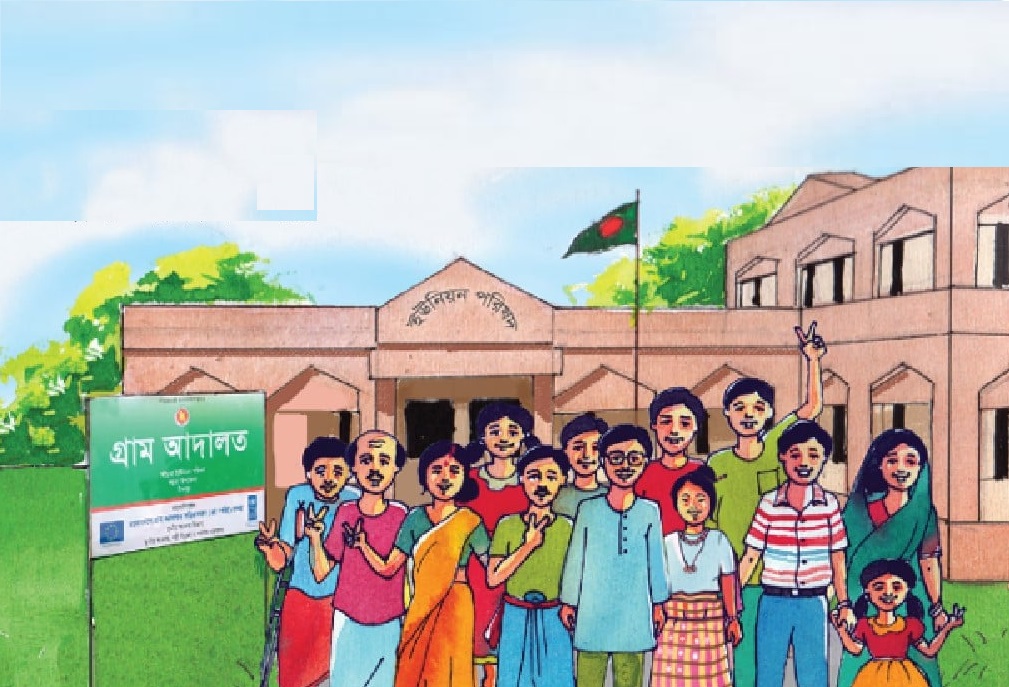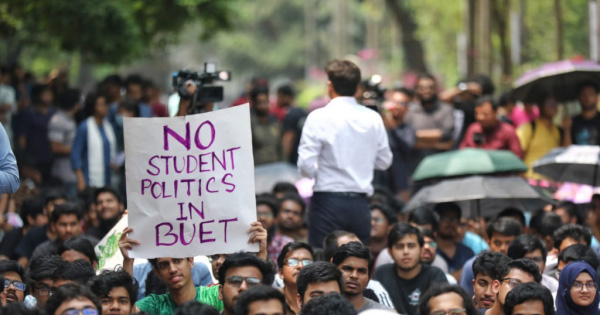In a country where road accidents claim over 7,800 lives annually and injure thousands more, the government’s failure to address the glaring issues of road safety is nothing short of tragic. The horrific numbers tell a story of negligence: 5,629 accidents in 2021 alone, with an average of eight people dying each day. These figures are not just statistics; they represent human lives lost, families destroyed, and a nation that is left reeling from preventable tragedies.
Yet, despite the grim reality, the authorities remain frustratingly inactive. Student protests, like the recent one held at Rampura Bridge, have become a symbol of the growing frustration over the government’s inability to manage road safety. The students have taken to the streets, demanding accountability, transparency, and above all, action. Their campaign to “show red cards” to traffic violators highlights the urgency of the situation—an urgency the government continues to ignore.
The heart of the problem lies in the corrupt and mismanaged road management system. Students have pointed out that road accidents are not isolated incidents but the result of systemic failure. From untrained drivers, reckless speeding, and the widespread use of mobile phones while driving, to the lack of proper enforcement of traffic laws, it is clear that the issue extends far beyond individual mistakes. This dangerous mix is exacerbated by poor infrastructure, insufficient road safety measures, and a shocking disregard for human life on the part of those in power. Student leaders, like Shohagi Samia, have been vocal about the core issue: corruption. “We’ll show red cards against corruption,” she declared, calling out the very forces that have allowed this deadly system to persist. Without proper oversight and a firm crackdown on the bribery, negligence, and shortcuts taken by road management authorities, Bangladesh’s roads will remain a death trap. But the government, instead of focusing on these real issues, has turned its attention to quelling the protests and silencing the voices of reason.
Adding to the students’ frustrations is the aggressive stance of law enforcement against peaceful demonstrators. The case of Emon Hossain Nayeem, who was allegedly assaulted by a police officer for merely asking to check the papers of a bus, is a glaring example of this. According to Nayeem, the policeman tried to strangle him and threatened to place him in remand—a chilling display of abuse of power. Denials from the police station only further the distrust between the public and those who are supposed to protect them. Instead of addressing the legitimate concerns of the students, law enforcement’s response has been to suppress the movement. Police have warned about “outsiders infiltrating the ranks of students,” framing the protests as a potential threat to public order. But this narrative conveniently shifts the focus away from the real issue: the government’s abysmal failure to enforce road safety and protect its citizens. It is the police’s responsibility to ensure the safety of the protesters, not to intimidate and abuse them. The students’ demands are logical, and their right to protest is constitutionally protected. Yet, their voices are met with violence and hostility.
In response to the growing unrest, bus owners in Dhaka made a half-hearted offer to reduce fares for students—a conditional and limited concession that was rightly rejected by protesters. The students are not only fighting for their own well-being but for the safety and rights of every citizen in Bangladesh. Their demands include a nationwide discounted fare for students at all hours, not just in select areas like Dhaka. This is a reasonable request, especially in a country where public transport is riddled with inefficiencies and dangers. Why should students be forced to bear the brunt of rising costs when the government cannot even guarantee their safety on the roads? The government’s response, or lack thereof, reveals a disturbing disregard for public safety. Every day that passes without meaningful action is another day in which lives are at risk. The students’ demand for safer roads and affordable transportation is not just their fight; it’s a call to action for every Bangladeshi who wants to see a country where lives are valued over profits and political interests.
Reforms needed:
The situation on Bangladesh’s roads is an emergency that demands immediate action. To combat this crisis, the government must:
1. **Root out corruption in the road management system**: There needs to be transparency and accountability at every level, from issuing driving licenses to monitoring public transport.
2. **Implement strict enforcement of traffic laws**: Reckless driving, the use of mobile phones while driving, and overspeeding must be punished severely. Road safety rules should be applied consistently and without exception.
3. **Improve driver training and road infrastructure**: Too many accidents are caused by inexperienced or poorly trained drivers. Mandatory, rigorous training and testing must be enforced before anyone is allowed to drive on public roads.
4. **Respect the rights of protesters and address their concerns**: The students are not the enemy. They are the voice of a generation that is fed up with empty promises and government inaction. Suppressing their movement will not solve the problem; addressing their demands will.
The ongoing protests are a desperate cry for change—a cry that the government cannot continue to ignore. Bangladesh’s roads will only become safer if those in power take responsibility for the systemic failures that have led to this crisis. Students should not have to risk their lives every time they step onto a bus, nor should they be forced to protest for basic safety measures that should have been in place long ago. The government’s negligence has already cost too many lives. The students’ message is clear: no more deaths, no more corruption, no more excuses. The time for action is now, and until the government makes a genuine commitment to improving road safety, these protests will—and should—continue.






